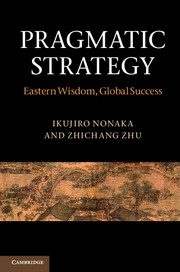Preface
Published online by Cambridge University Press: 05 June 2012
Summary
Preface
This book is the outcome of an unexpected cooperation. It began on a sunny winter afternoon in 2007, at Jiro’s Hitotsubashi University office overlooking the Imperial Palace in downtown Tokyo. It was the first time Jiro and Zhu sat down together. Two days earlier, Jiro delivered a keynote speech at a conference in Ishikawa. After the speech, as Jiro’s students struggled to create a path for him to escape from the enthusiastic audience, Zhu managed to present him with a business card, saying ‘Professor, it was I who wrote that article.’ The article, just published in a knowledge management journal, was titled ‘Nonaka meets Giddens: a critique’. When the conference ended, Jiro invited Zhu to Tokyo.
Zhu expected a barrage of questions, corrections and instructions. Instead, after being served the first round of green tea, the conversation was about the worries and joys of being a father, calligraphy and sushi, Confucius and Dewey, Mao Zedong and T.E. Lawrence, IBM and Lenovo, changes in Japan and the rise of China. Before the second round of green tea, Jiro suggested co-authoring a book on corporate strategy.
Jiro and Zhu talked to each other in English. The differences between them, however, go beyond native languages. Jiro received rigorous training at Waseda University, obtained a degree in political science, worked in a Japanese corporation for ten years and wrote several books on military and business strategies before writing the award-winning The Knowledge-Creating Company. At the time of our meeting, Jiro was being bombarded by competing invitations from the worldwide business and academic communities.
- Type
- Chapter
- Information
- Pragmatic StrategyEastern Wisdom, Global Success, pp. xv - xxPublisher: Cambridge University PressPrint publication year: 2012



